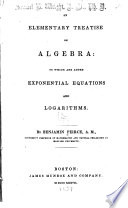 | Benjamin Peirce - Algebra - 1837 - 300 pages
...the system of logarith'mSj is of great importance ; and the logarithm of a number may be defined as the exponent of the power to which the base of the system must be raised in order to produce this number. Logarithm of Product and of Power. 6. Corollary. When the base... | |
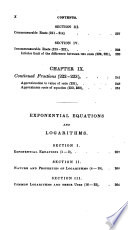 | Benjamin Peirce - Algebra - 1837 - 302 pages
...of the system of logarithms, is of great importance; and the logarithm of a number maybe defined as the exponent of the power to which the base of the system must be raised in order to produce this number. Logarithm of Product and of Power. 6. Corollary. When the base... | |
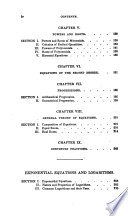 | Benjamin Peirce - Algebra - 1843 - 308 pages
...of logarithms, is of great importance ; and the logarithm of a number may be defined as the ezponent of the power to which the base of the system must be raised in order to produce this number. Logarithm of Product and of Power. 8. Corollary. When the base... | |
 | James Thomson - 1848 - 326 pages
...number, and y its logarithm, we arrive at the conclusion, that the logarithm of a number is the index of the power to which the base of the system must be raised to produce that number. Thus, in the common logarithms, m which 10, the radix of the decimal... | |
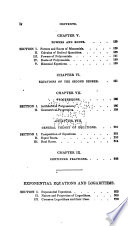 | Benjamin Peirce - Algebra - 1855 - 308 pages
...system of logarithms, is of great importance ; and the logarithm of a number may be denned as t/ic exponent of the power to which the base of the system must be raised in order to produce this number. Logarithm of Product and of Power. 8. Corollary. When the base... | |
 | James Mills Peirce - Logarithms - 1873 - 104 pages
...number to which all numbers are referred in that system. It may have any positive value except unity. The logarithm of a number in any system is the exponent...the power to which the base of the system must be raised to produce that number. The antilogarithm of a number is that number of which the given number... | |
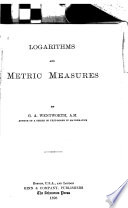 | George Albert Wentworth - 1898 - 112 pages
...fixed number to which all numbers may be referred. The base may have any positive value except unity. The logarithm of a number in any system is the exponent of the power to which the base must be raised to produce that number. Thus, if a is the base, and n and x have such values that a*... | |
 | Education - 1918 - 922 pages
...commonly in use should be clearly and definitely impressed. The logarithm of a number is the index of the power to which the base of the system must be raised to equal a given number. This can be done by having the pupil show that the log 1000 to the... | |
 | Education - 1918 - 984 pages
...commonly in use should be clearly and definitely impressed. The logarithm of a number is the index of the power to which the base of the system, must be raised to equal a given number. This can be done by having the pupil show that the log 1000 to the... | |
 | Horace Wilmer Marsh - Mathematics - 1913 - 518 pages
...obtained by raising 10 to a power indicated by the exponent — 1, that is, .1 = 10-1. But by definition, the exponent of the power to which the base of the system must be raised to equal a given number, is the logarithm of the number. Therefore (a) log .1=—! and (6) log... | |
| |